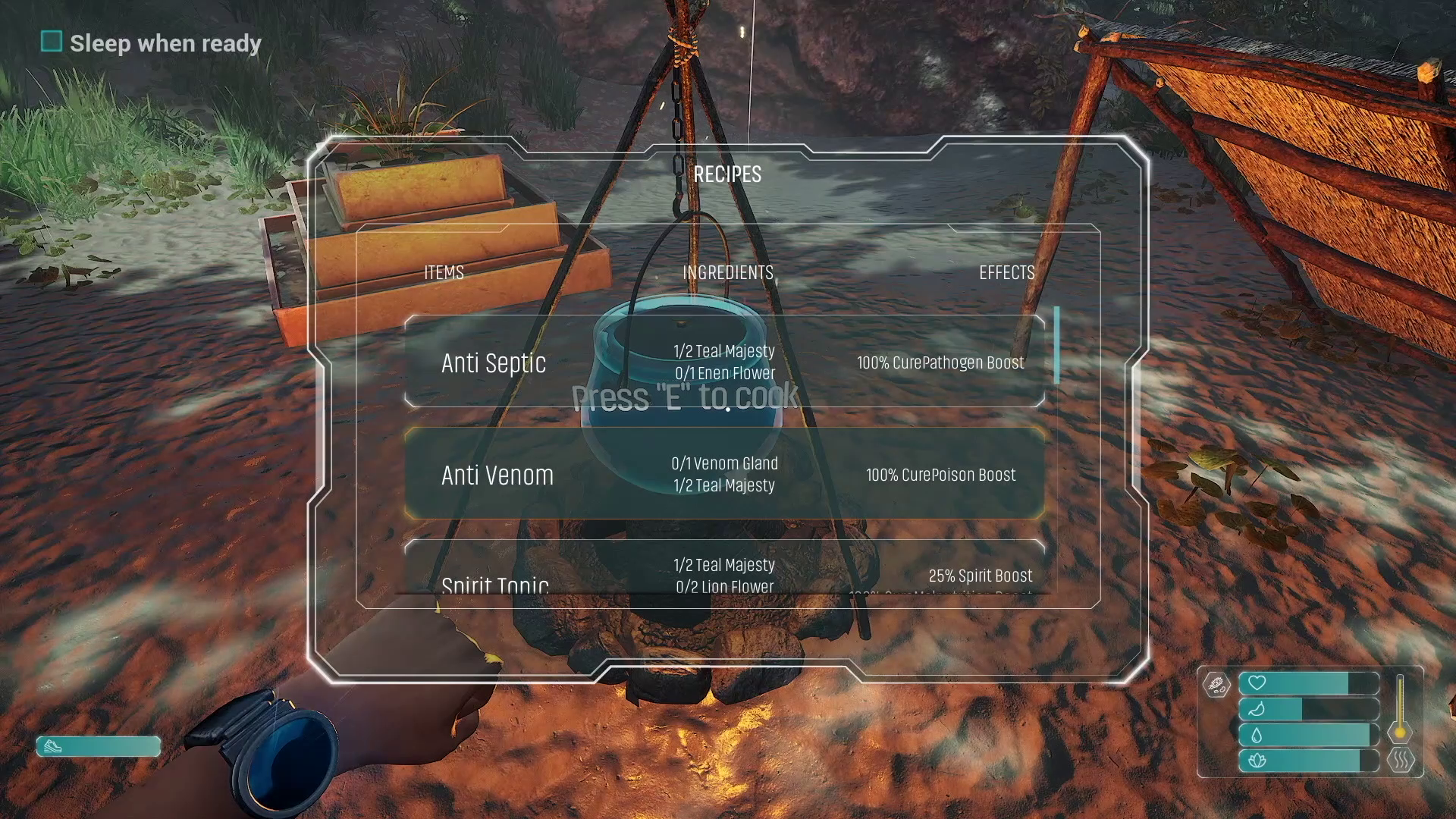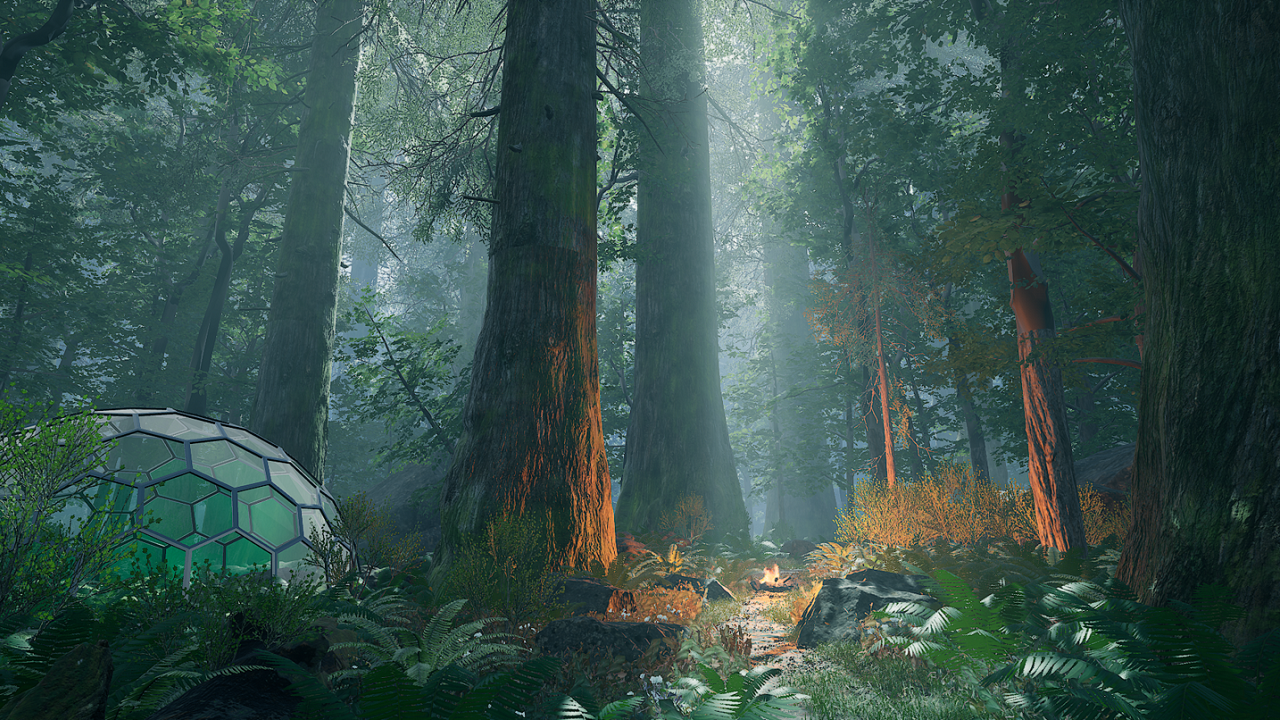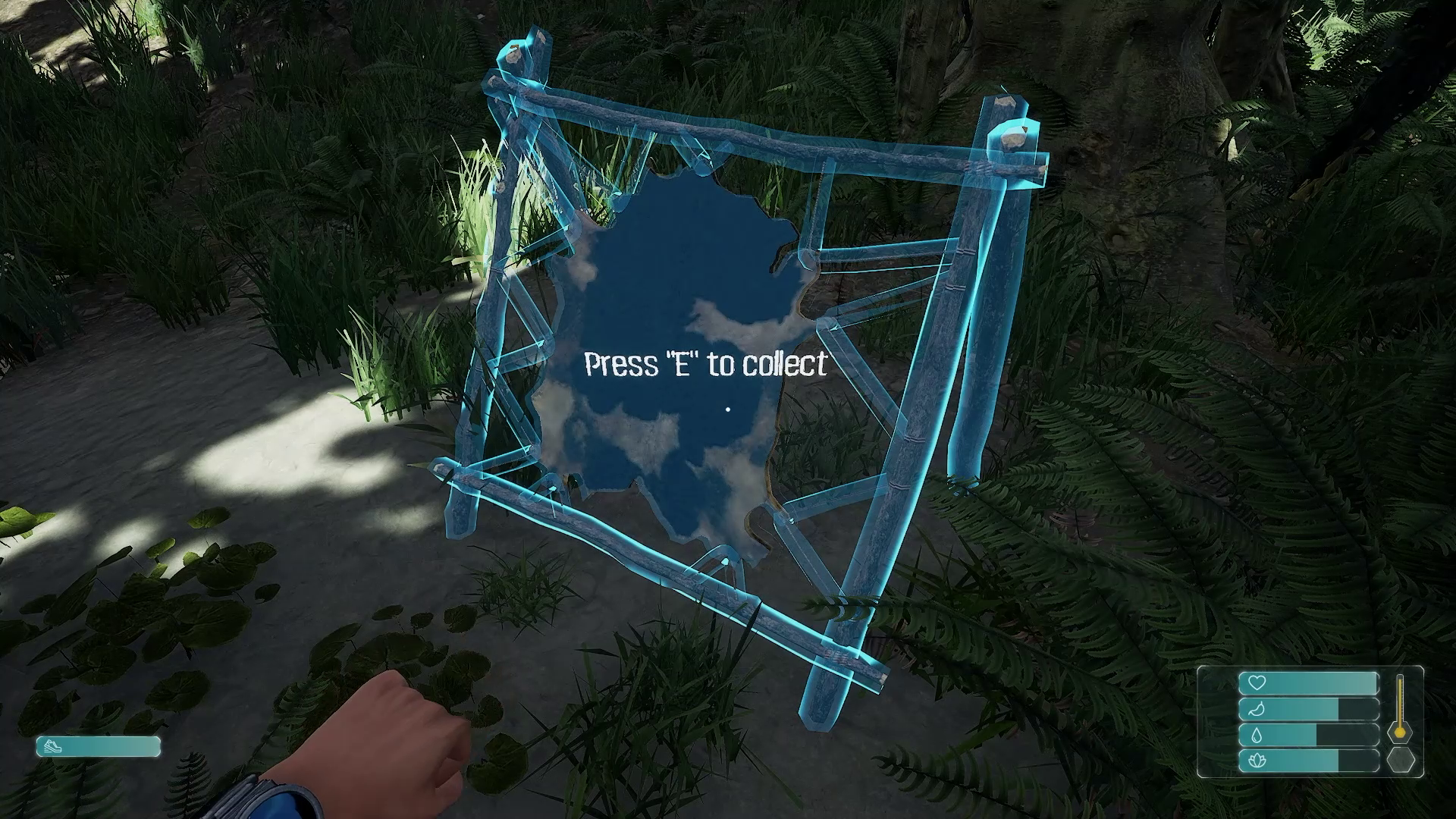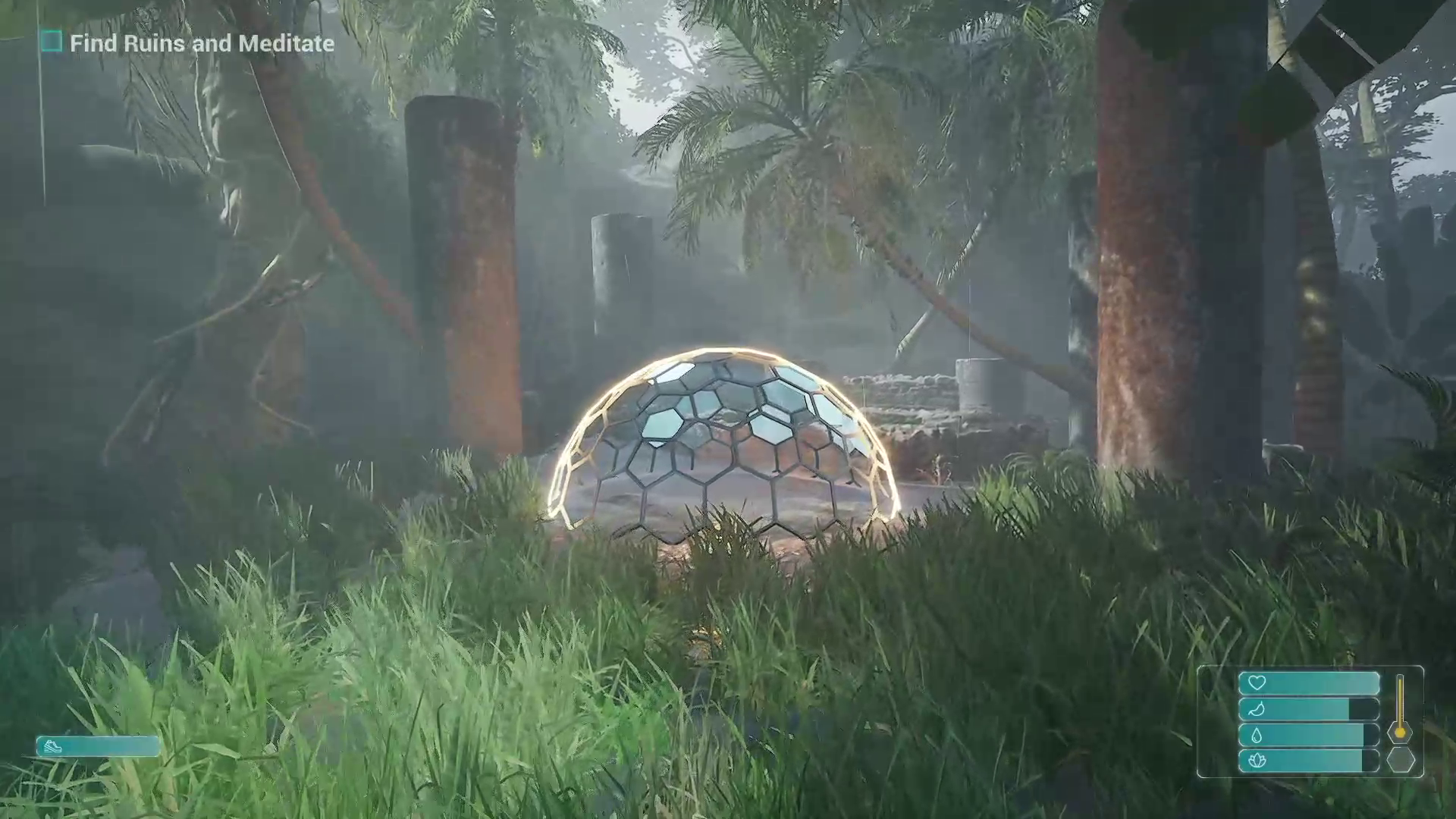The effects of human-caused and human-exacerbated climate change are now impossible to ignore. Radical changes beyond natural fluctuations have begun to wreak havoc across the globe, putting humanity’s future at grave risk. Even with dutiful, proactive effort, the best outlook may be avoiding the worst possible outcome: a global ecosystem brought to or beyond the brink of extinction.
Potentially, we’re already on the trajectory portrayed in the opening moments of Head West’s Retreat to Enen, which explores a timeline where humanity’s overconsumption and lack of prescience doomed society to an ignominious collapse. But this isn’t your typical post-cataclysm shrouded in the dense cloak of war and famine (though that happened long ago). The world has seemingly bounced back, with the vestiges of humankind learning from its mistakes, focused on rediscovering the necessary symbiosis between it and nature.
With such a goal, some introspection is undoubtedly needed, leading to a pivotal mindset shift — one that rejects untenable consumption and embraces mindful sustainability. One avenue is self-reflective meditation, a core pillar in Retreat to Enen‘s gameplay loop, which at regular intervals charges you to pause and consider the world around you. It’s a unique mechanic not found in any other survival game, allowing Enen to accent the typical beats of the genre while calling attention to how we interact with our natural world and the digital ones we frequent.
The issue is that outside of those bounds, Retreat to Enen struggles to be a mechanically compelling experience, stirring up unnecessary frustrations that act in direct opposition to its contemplative core.
Retreat to Enen Review: Paradise Lost
Set more than 2,500 years in the future, Retreat to Enen portrays an Earth well on the path to healing. Humans have learned to live in lockstep with the world, theoretically taking only what they must to endure while becoming custodians instead of parasites. To prove yourself as one of these caretakers, you’re tasked with venturing into the wilds to survive and reflect upon your purpose before bringing your knowledge back to share with future generations.
An obviously Biblical play on words, the land of Enen is one of striking landscapes spread across three distinct biomes: the sand-strewn subtropical island of Enen itself; the dense, sylvan acreage of The Valley of the Giants; and the snow-swept crags of the frigid Great North. While these places may be visually lush, they’re oddly devoid of life on the scale expected from the lite narrative setup, adding an inescapable weight of emptiness to Retreat to Enen.
The odd turkey gobbles as it runs through the brush or snow, a lone deer meanders through the trees and undergrowth, a solitary fish swims in the waves above undulating kelp forests and poisonous anemones. Not filling the world with creatures is perhaps an attempt to build a firm sense of place through the most environmental of environmental storytelling. Maybe the Earth isn’t as far along the path of healing as suspected. But there’s a palpable disconnect between the life these environments could reasonably support at this point in Earth’s rejuvenation and what they actually do support.
To kill and harvest these animals is a chore, too, and in ways, further decouples the idea of survival from the ideal of custodianship that battle at the game’s core. To conceivably dissuade you from hunting entirely, rabbits and boars are master escape artists, with some capable of disappearing through the trees as soon as you see them, not when they see you; deer and iguanas are likewise highly attuned to your presence at every turn. Wolves, bears, and snakes will attack you without provocation, though they are strangely less aware of your existence despite being apex predators and often get stuck on the environment.
Hunting, in short, is a laborious process that can be literally hit or miss — the spear animation makes thrusts wobbly and inaccurate, and the lack of any hit indicators, visual or auditory, for arrows makes ranged attacks hollow and hard to trace. Traps and nets are utterly useless, incapable of catching anything no matter how long they’re left out or where they’re placed (at least over 12 hours of play, in my experience).
What makes things more existentially complicated is that some animals provide only meat while others provide only pelts, and in a game with deeply rooted themes of sustainability, the more realistic and better option would have been that each animal drops multiple materials when brought down if a hunting system must be included. At the very least, every part of the animal should be used in some crafting component as a sign of respect that aligns with the game’s motifs. When you can’t chop down trees or dig holes, but you can kill an animal and leave most of it behind, there’s contradiction between the message and mechanics.
Alongside hunting, there’s gathering, of which you’ll do a great deal in Retreat to Enen. You’ll pick up all kinds of materials from the ground, ranging from sticks, rocks, and clay blocks to potatoes, mushrooms, and medicinal herbs. Mining is also an option, but not in the traditional survival-game sense. Instead of existing as veins running through the ground or across escarpments, ores and gems are attached to rocks and cliffs in clusters, which you’ll break apart with your futuristic Quantum Control ability, the same one used for harvesting animals.
These mats are, of course, used to craft items, build structures, cook meals, and brew medicinal tonics, all subs-systems that sound more in-depth and less tedious than they actually are.
The in-game UIs are painfully opaque and difficult to read, with far too transparent backgrounds and text far too small. While there are options to add or remove predators or to nix the HUD altogether, there aren’t any options to increase menu transparency or text size, two things that would be nice quality of life additions for everyone, not just those with impaired eyesight.
Building outlines jitter and flip around wildly as you try to place them, making it difficult to construct even single structures, let alone expansive, intricately designed camps, as shown in several pre-release marketing materials. Most components used to build houses and other more intricate items are locked until the end of the second biome, well after the entire process of meticulously gathering materials or doing most anything else has likely slipped into tedium.
Cooking gives you access to a wide variety of dishes, though there’s no way to cook single items like meat on the campfire, a strange deviation from the typical survival formula. Frustratingly, none of the meals can be added to your inventory after they’ve been made either. It’s an odd choice to rely on fruits, vegetables, and smoked meats while away from your campfire cooking pot when you can brew and subsequently carry antiseptic and anti-venom with you anywhere, healing parasite infections or snake bites while exploring.
But exploration, too, is fraught with frustration. There is no map or compass in Retreat to Enen, forcing you to flex your navigational and memorization skills to the extreme. The absence of these foundational wayfinding tools makes little sense considering the technologically advanced features of your suit, which can manifest buildings from holograms or disappear animal carcasses in a film of blue light.
To be fair, it’s possible to place navigational flags leading to and from points of interest, but crafting them requires a flower found only in the first biome. You’ll spend a copious amount of time searching for them or growing them in planters (Retreat to Enen‘s barebones farming system that barely counts as a farming system) that it’s more time efficient to make note of landmarks and move forward to the next objective.

Indeed as a way to remind us our actions have consequences, Spirit plays a pivotal role in Retreat to Enen. Managed alongside your hunger, thirst, health, and temperature meters, Spirit dwindles over time and when performing actions tied to Quantum Control, such as mining and harvesting animals. It’s a neat concept in theory and one of the elements that ties directly into the grander principles running through Retreat to Enen. But it’s easily subverted (at release) by quickly switching Quantum Control on, initiating an action, and switching it off. If you let that realization influence you, there’s very little weight to it.
As Spirit dwindles, you must seek out meditation points across each of the biomes to replenish it. In these cerulean geodesic domes, you’ll take a breath to relax and contemplate the world around you, following on-screen prompts to inhale and exhale, providing real-life calming benefits not often found in video games. To take things further, each biome has three well-hidden Arcadian ruins that must be discovered to unlock more crafting and building recipes and to reach subsequent biomes to finish the game.
They’re also where you’ll find gold meditation domes with guided mindfulness exercises led by a gentle, balmy voice. These lessons are similar to those found in mental wellness apps like Calm and Headspace, grounding you both in-game and in real life. Using a good set of headphones and closing your eyes, the serene sounds of Enen‘s biomes tangibly lower anxiety and stress, helping you walk away refreshed, grounded, and aware of your effects on the world around you.
It’s too bad, then, that these gold domes disappear once they’ve been used, only accessible through subsequent playthroughs, and that the monotony of doing essentially everything else wipes that calmness away.
Retreat to Enen Review — The Bottom Line
Pros
- Majestic, varied landscapes.
- Effective meditation exercises.
- Thought-provoking.
Cons
- Tedious gameplay loop.
- Unbalanced systems and mechanics.
- Frustrating lack of navigational tools.
- Contradictory themes and messaging.
- No way to revisit meditation exercises.
- Little replay value.
Retreat to Enen says a lot about our role on this planet. We are caretakers that should do what we can to preserve our only home in this vast, near-limitless universe, lest we doom ourselves entirely. It’s our duty to find sustainable ways to coexist with the ecosystems around us, passing that knowledge to future generations so that they might learn from our mistakes. In that way, Enen represents not a physical or digital space but moreso a spiritual one within us.
That’s a big message to tackle in such a small package — and Retreat to Enen is an admirable attempt at doing that. It reminds us to be patient, take a breath, and calm ourselves, think clearly, and make more meaningful decisions about our environment. But with apps like Calm already providing easily-accessible spaces for meditation and reflection, a central message that’s unfortunately muddled by contradictory and subjective views on sustainability, and lackluster survival mechanics and systems that get in the way, it’s hard to recommend a retreat to Enen.
[Note: Freedom Games provided the copy of Retreat to Enen used for this review.]









Published: Aug 4, 2022 12:44 pm